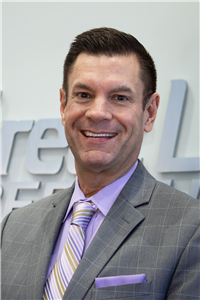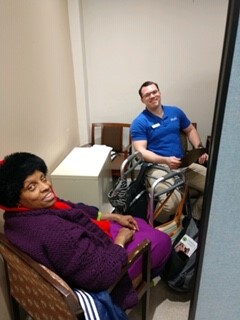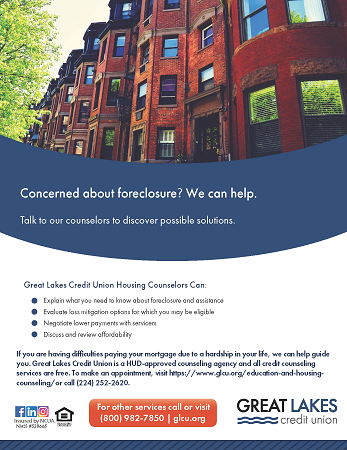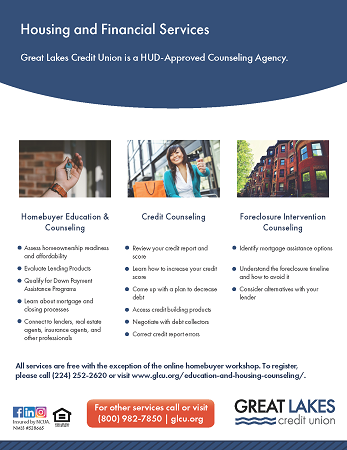Top-Level Takeaways
-
GLCU operates a HUD-certified program that has helped the credit union serve more than 1,500 members and non-members in the past three years.
-
The cooperative’s housing work continues amid the COVID-19 lockdown in the Windy City, but with some changes.
When Great Lakes Credit Union ($886.2M, Bannockburn, IL) merged in tiny North Side Community Federal Credit Union last year, GLCU did more than assume approximately $9 million in assets, 3,000 members, and a branch in downtown Chicago. The big cooperative also took on the responsibility of operating a HUD-certified, grant-funded housing and financial education program that is one of fewer than 20 in existence across the country.
What’s more, GLCU has since expanded the program and now considers it part of the credit union’s fundamental mission to financially strengthen vulnerable members of its community. Today, GLCU’s education and housing counseling department now works separately from the cooperative’s other financial wellness and literacy programs. It has its own HUD-certified staff working through its 12-branch network around Chicago with guidance from the smaller credit union’s former CEO who now serves as GLCU’s chief development officer.
Each home saved or purchased brings hundreds of thousands of dollars in assets to a community, which positively affects education, health, and safety.
Neighborhoods already economically stressed are considered particularly vulnerable to the business shutdowns and job losses caused by the COVID-19 pandemic. The work, however, goes on at GLCU.
Here, president and CEO Steve Bugg talks about the housing education and counseling at GLCU.
How has the pandemic affected the housing program’s activities at GLCU?
Steve Bugg: We’ve had to stop in-person counseling and group sessions. However, that has not stopped our team. They continue to hold counseling sessions over the phone and via Webex. In fact, they’ve been busier than normal. We’ve also increased production and posting of blogs and video content as a supplement to our more formal counseling.
We anticipate a higher demand and need for counseling services during the recovery phase and will be ready and willing to work with our clients and support requests from our non-profit partners.
What impact has the counseling had? How do you measure that?

SB: We use a HUD-approved client management system (CMS) that records all client information, including outcomes. This CMS allows staff to pull monthly, quarterly, and annual reports. From here, we can synthesize outcomes. From 2017-2019,our counselors served more than 1,500 residents in the areas of financial capability, homeownership education, and foreclosure intervention counseling.
Among those that engaged in follow-up services, 931 developed a sustainable budget; 734 increased their financial capability by having documented an increase in discretionary income, savings, or credit score or a decrease in debt load; 110 reported gaining access to resources that helped them improve their housing situation; 40 purchased housing; and 34 resolved a mortgage default after counseling.
Each home saved or purchased brings hundreds of thousands of dollars in assets to a community, which positively affects education, health, and safety.
How is the housing program at GLCU structured?
SB: We employ a senior manager and three counselors placed in specific counties within our field of membership. This team is part of our community development department and rolls up to our chief community development officer. Our senior manager splits her time between our corporate headquarters and our housing counseling main office in our Uptown branch in downtown Chicago. We have a counselor there, too.

What does the counseling involve? What do the counselors do?
SB: Counseling is open to anyone with an expressed housing or financial need. All sessions require a baseline financial assessment, which includes a credit report review, income assessment, affordability assessment, budget, and action plan.
Based on the goals and needs of each household, counselors identify several options or provide referrals. This can include recommendations such as how to increase one’s credit score to obtain a debt consolidation loan, how to apply for a loan modification, or how to obtain down payment assistance to buy a home.
Why did GLCU decide to expand the housing program when it merged in North Side?
SB: We see it as a way to help us remain competitive and relevant in a competitive marketplace today and into the future. We also have a keen desire to empower and improve our communities through aggressive mission-centric work.
With North Side’s model and GLCU’s scale we knew we could expand what North Side did to assist members as well as non-members. We already knew from our financial wellness efforts and employee and member feedback that there was great need. This was an opportunity to relatively quickly implement this strategy.
What were the opportunities and challenges in expanding this service? How did you identify those?
SB: Serving a wider community through this mission-centric work was a driving force for us. First, we needed to understand the financial impact to front the housing counseling program funds and the risk if we did not receive grant funds. We also developed a timeline upfront for hiring and onboarding qualified employees that would not place additional stress on the small department North Side had.
GLCU also had to identify our local communities that had the largest need. Our chief development officer, the former CEO of North Side, reached out to all our communities to determine where we needed to focus first. We also needed to enhance our own tracking and reporting along with accounting for grants applied for and funds received. North Side’s seasoned staff help us reduce the transition time.
How does GLCU fund and budget for this program?
SB: We have grants from the state, the city, and HUD. Each grant requires funds to be allocated to counselor salaries, training, and operational costs for the department. This is highly monitored, with audits often occurring annually. Per our grant agreements, our counselors do not steer toward GLCU products or services and serve the entire community, not just GLCU members. That needs to be underlined. We cannot steer clients.
Our senior manager does the grant applications, using historical data and community trends to share the impact of housing and financial counseling for the various communities served. Counselors’ credentials, the organization’s leadership, and budget are also assessed.
Grant funds are placed in the proper general ledger account and are credited as misc. income, noted as grant funds received. This does not necessarily align with our budget cycle, which is on a calendar year, so GLCU fronts the funds needed for the housing counseling program.
We do not view our grant-funded program as a revenue generator. It’s a way to support our mission-related work under our people helping people philosophy. However, the expansion of counselors is dependent on grants and our annual budget. If grants were to be reduced or eliminated, we would review our program in our annual budget process as we do with our functional areas today.
How do you identify and train certified counselors?
SB: Candidates interested in counseling have to demonstrate strong communication skills, experience in community relationship building, and a passion for advancing equitable, livable, and resilient communities.
Counselors must become HUD-certified and obtain NCHEC certifications in financial capability, homeownership counseling, homeownership education, post-purchase education, and foreclosure intervention and default counseling.
This must be completed within 18 months of hire. To be able to meet these demands, administrative staff designs a training schedule that prioritizes required courses and reviews material learned through trainings. Additionally, new counselors shadow counseling sessions for at least 90 days. Counseling sessions, where certification is not yet obtained, must be facilitated and or supervised by a certified counselor.
What other responsibilities do counselors have?
SB: Our HUD-funded housing counselors are busy and, because of the HUD guidelines, focus solely on their program. They do not serve in any other capacity at the credit union other than educating our employees so they understand what the counselors do and can refer members and non-members.




How do you get the word out about the program?
SB: We use email and direct mail, in-branch digital displays, social media, and flyers. GLCU also has a web page for the housing counseling program that includes upcoming seminars and workshops. We partner with local non-profit agencies, and we also offer our services to other financial institutions for their customers and members.
How are members referred? Is the program just for members?
SB: Referrals come from our staff, our call centers, retail (in-branch) employees, local non-profits, banks, other credit unions, and government agencies. Some members even refer family and friends to our counselors. Our counselors also develop relationships with their clients, so word-of-mouth has worked extremely well for us. And, with our seminars and workshops listed on our website, individuals will self-refer.
This program’s success is dependent on serving anyone from our community and not just our GLCU members. This is required by HUD
How do you integrate the counselors’ work with GLCU’s products and services? Is it a requirement for certain loan products, for example?
SB: We can’t steer or direct our housing clients to GLCU for any product or service, but we can be on the list the counselors provide to clients. GLCU employees have referred our members to our counselors based on the need of the member.
Our collections team will refer members to our housing counselors; however, we still follow our policies and procedures within the collections area.
We do provide some down payment assistance on specific products for mortgage loans that require those members complete counseling services. We do not mandate it can only be from our housing counselors. If those members have the proper certification completed, we will honor that certification regardless of where it comes from to access the down payment assistance.
How does this program fit into GLCU’s mission as a member-owned cooperative?
SB: A key element of the merger with NSCFCU was that it enabled us to become a low-income designated credit union. This fits well into our mission-centric philosophy, which we are currently enhancing. Like all credit unions, our foundation is the cooperative principle of people helping people. Expanding our counseling services supports the cooperative spirit behind what we provide to our valued member-owners and the general community. Members tell us through our surveys and in our interactions that they take great pride in the fact their financial institution walks the talk and supports mission-centric strategies.
What is one recommendation you have for credit unions that want to take on such a project?
SB: Currently, HUD says it will not provide approval status for additional credit unions in the future, making our status unique. However, credit unions could provide counseling services through a variety of other means that could be directly supported by the credit union or through a credit union’s non-profit foundation. Non-HUD grants can be applied for through a foundation for a credit union’s counseling services. A variety of certifications exist that are non-HUD related for those types of efforts.
What is one thing you recommend credit unions do not do?
SB: Regardless of the type of services a credit union provides for counseling or financial wellness, the strategy should be focused on providing mission-centric work and not simply to make a profit.
What is the final piece of advice you have for other credit unions considering this kind of housing counseling?
SB: GLCU obtained HUD counselors through the acquisition of a small credit union that was part of a pilot program no longer offered by HUD. However, our recommendation is that all credit unions apply academic discipline to all their financial education programs to ensure members and non-members are receiving information that is truly of value.
This interview has been edited and condensed.